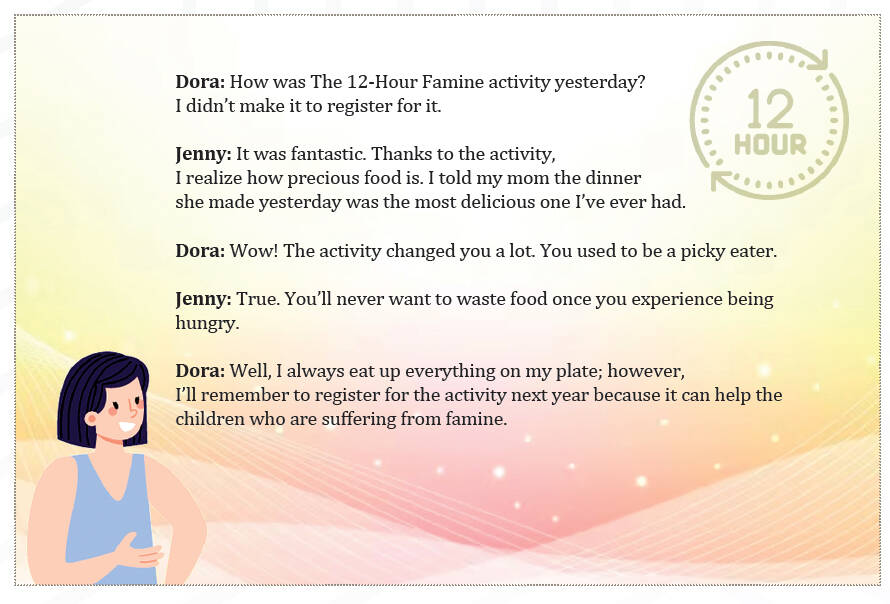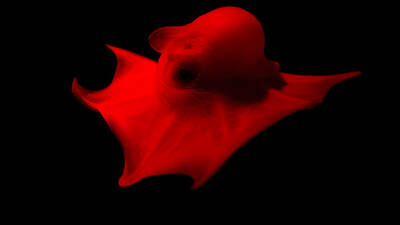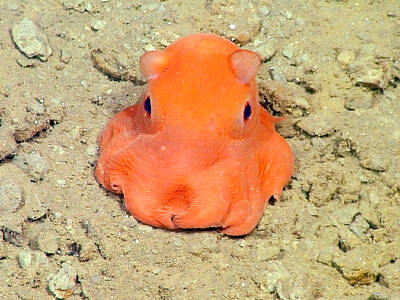The two junior high school students are talking about “The 12-hour Famine” activity.
2個國中生正在討論「感飢十二」活動。

Dora: How was The 12-Hour Famine activity yesterday? I didn’t make it to register for it.
Jenny: It was fantastic. Thanks to the activity, I realize how precious food is. I told my mom the dinnershe made yesterday was the most delicious one I’ve ever had.
Dora: Wow! The activity changed you a lot. You used to be a picky eater.
Jenny: True. You’ll never want to waste food once you experience being hungry.
Dora: Well, I always eat up everything on my plate; however, I’ll remember to register for the activity next year because it can help the children who are suffering from famine.
必備單字
1. delicious adj.
美味的(國中基礎1200字)
2. experience v.
經歷(國中基礎1200字)
實用字詞
1. famine n.
飢荒
2. precious adj.
珍貴的
3. suffer v.
受苦;受難
閱讀技巧:
找出長句中的主要主詞和動詞,以利閱讀。
Thanks to the activity, I realize (S + V) how precious food is.
多虧了此活動,我明白食物有多珍貴。
考題練習:
TOEIC Bridge測驗 X 國中會考題型
1. What are the students talking about?
(A) A game.
(B) A subject.
(C) An activity.
2. What was the student doing during the 12-Hour Famine activity?
(A) Having dinner with their family.
(B) Not having food.
(C) Playing games.
3. Based on the reading, what can we infer?
(A) Dora didn’t join the activity.
(B) Jenny used to finish all her food each meal.
(C) The activity won’t help hungry children.
解答:
1. (C) 2. (B) 3. (A)
文章由TOEIC Program Taiwan · Chun Shin提供:
www.facebook.com/ToeicProgramTaiwan

The deep waters off the coast of California are home to a bizarre creature: the flapjack octopus. This creature, known for its pancake-like appearance, spreads itself thin on the seabed as a clever survival strategy, making it difficult for predators to spot and capture it. With its unique, umbrella-shaped body formed by webbed arms, the flapjack octopus moves through the water in a graceful manner. It propels itself forward by rhythmically moving its body and contracting its webbed arms. Its pair of ear-like fins, which move independently yet with remarkable coordination, also help it explore the deep-sea environment. These

Bilingual Story is a fictionalized account. 雙語故事部分內容純屬虛構。 I stand by the Miluo River as dusk falls. The court betrayal is too much. I served Chu with loyalty. I forged alliances and fought corruption. But the whispers of jealous courtiers, the murmurs of treason, spoke louder. The king cast me out. The water looks calm. It promises peace. I step in. The river is cold against my legs. I hear shouts behind me — fishermen calling my name. I keep walking. The calls grow louder, but I do not turn around. The water rises to my chest. It pulls at me. I

Continued from yesterday(延續自昨日) https://www.taipeitimes.com/News/lang Many people may be familiar with flapjack octopuses thanks to Pearl, a charming character from the Pixar film Finding Nemo. However, her portrayal presents several scientific inaccuracies. In reality, flapjack octopuses are deep-sea creatures, which are unsuitable for the brightly lit shallow reef environment depicted in the film. Their primary defense mechanism relies on their reddish coloration, which would be ineffective in the well-lit shallows. Pearl’s famous line, “You guys made me ink,” is another fictional detail that is not consistent with the observed actions of real flapjack octopuses. As common as it is in many other octopus

In Taiwan, people can use a platform to rent a power washer for a weekend or share unused garage space for someone’s storage needs. These are examples of the sharing economy, a consumption model that has gained widespread adoption worldwide. This approach allows people to rent or share assets like cars, homes or even services, typically through online platforms. This innovative model poses a simple yet powerful question: why purchase infrequently used items when sharing is more practical? By making useful but idle resources accessible, the sharing economy turns them into sustainable opportunities. Internationally, platforms like Airbnb and Uber have popularized